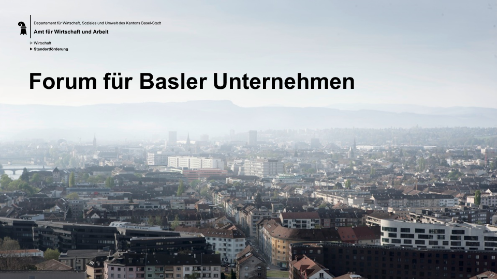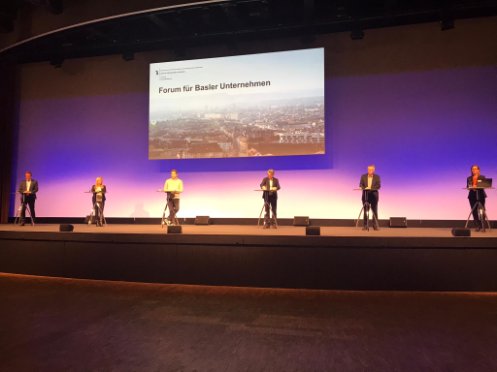First Forum for Basel-Stadt Businesses

What’s next: Whereto after the year of the corona crisis? This is exactly the question that four entrepreneurs were asking and answering in late November at the First Forum for Basel-Stadt Businesses.

Organised by the Economic Development of the Office of Economy and Labour AWA and moderated by Dieter Kohler, director of the Basel station of Swiss national broadcaster SRF, the event offered a snapshot from the economic region of Basel, insights and lessons of the crisis, along with a cautiously optimistic outlook for the coming year.
Unsurprisingly, COVID-19 is also the most pressing issue of 2020 for the region’s economy. According to the most recent economic forecast for the Swiss economy by the independent Swiss research institute BAK Economics from November, real GDP growth in the canton of Basel-Stadt is expected to be at around +1,09% in 2020, while Switzerland as a whole is facing a national downturn in the range of –3,8%. A note of caution applies to the BAK forecast due to substantial insecurity about the hereto unknown further development of the pandemic.
Yet, according to a UBS study, value creation in the canton of Basel-Stadt appears indeed more robust and crisis-proof than in other Swiss cantons, mostly because Basel-Stadt can count on its strong life sciences sector along with additional large corporations less impacted by COVID-19. On a closer look, however, the pandemic has affected different companies and industries in different ways. Even in Basel-Stadt businesses are facing great challenges. Their flexibility in coping with the crisis is anything but impressive.
Take for example Jens Stocker, director of Bider & Tanner, the largest independent bookstore of Switzerland. When the lockdown was imposed, Stocker was forced to close his ‘house of culture’ overnight. In the immediate aftermath, the number of online and phone orders for books, music CDs and DVDs jumped by factor ten. Staff needed to be flexibly reassigned to new tasks, sales counters turned into packaging stations, and all customer service and book recommendations migrated to the telephone. Customers particularly enjoyed the personalized advice and help by phone, especially in times of social distancing and online shopping during the pandemic, Stocker emphasized.
Marc Wannhoff, CEO of Doetsch Grether, elucidated the differences between various international target markets and the impact COVID-19 had on them. A Basel-based company with a long tradition, Doetsch Grether specialises in marketing and distribution of products in the pharma, over-the-counter (OTC) and consumer care sectors. While the Swiss market barely showed any signs of fluctuation, international key markets were marked by much higher volatility in demand. Additional significant challenges for the company included the relocation of customer, advice and consulting services onto digital channels, and safeguarding the functioning of international supply chains.
Valérie Demenga, managing director of Demenga Glas AG, encountered a related problem: The possibility of partial or complete border closure. Early on in the pandemic, the 125 years-old glass manufacturer with Alsatian roots had to worry about the freedom of movement of its cross-border workers. It was unclear if Demenga employees residing in neighbouring countries would be allowed to cross borders to get to work. "We haven’t had this situation since the second world war", said Demenga. Luckily, there was no border closure affecting cross-border workers. But Demenga was prepared for the possibility that her employees would not have been able to commute to work anyway. As Plan B, Demenga Glas set up a network of temporary workers to compensate for any staff shortages. Demenga is proud about the pre-emptive measures and the flexibility that helped the company pull through the crisis.
Naturally, as a glass manufacturer, Demenga Glas was not in a position to offer a home office alternative to its employees – very much unlike the ICT company Adobe Basel: Already by March 2020, Adobe Basel had fully switched to home office operations. According to Lukas Ryf, Site Leader of Adobe Basel, this company-wide policy may remain in effect until July 2021. From location Basel, Ryf is responsible for managing the company’s entire adobe.com platform. Only recently, an annual Adobe convention was moved and held entirely in the digital realm – with more than 600'000 participants worldwide, significantly more than would ever have travelled in person to a convention in the real world. Despite these digital opportunities, Ryf suggested, working from the home office may in the long term complicate tasks such as introducing new hires to processes and corporate culture, and ultimately slow collective corporate creativity.
While the four corporate executives represented quite different industries and company sizes at the Forum, the panel clearly highlighted topics of shared concern for all of them. First and foremost, there’s absolute priority given to the health and well-being of their staff, followed by the importance of customer relations as the second common cause crucial in a pandemic. "You just have to remain flexible to do everything for your customers," explained Demenga. Which means that if necessary, e.g. if there’s no shipper or truck available, you will have to drive to your supplier to fetch an order of goods or products yourself.
The Forum participants agreed that digital devices are valuable tools to facilitate sales and customer service, staff coordination, as well as communicative and creative exchange. They also emphasized, however, that personalized exchange and contacts, direct communication with employees, customers, suppliers and partners will remain a central tenet of their operations in the future as well. Overall, the four companies shared a cautiously optimistic outlook for the next year, even though each of them anticipates the need for continued flexibility and prudence.
The objective of the First Forum for Basel-Stadt Businesses was to further strengthen the exchange and open communications channels between local companies, and between the private sector and public administration, particularly during challenging times like ours. In this spirit, the Economic Development Basel-Stadt will continue to cultivate and improve its contacts to Basel-based companies, and support local businesses by offering specialised advice and personalised services. We are looking forward to hearing from you and to answer any questions you might have!
